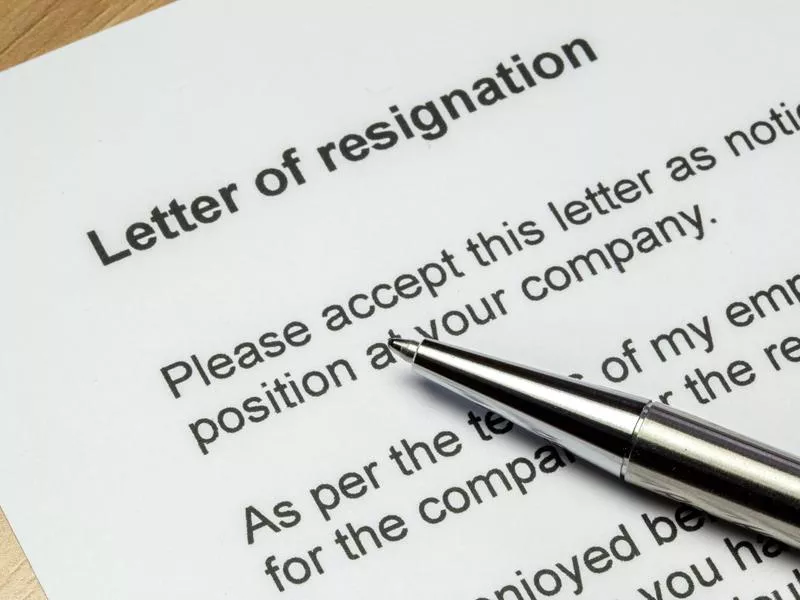Resigning from a job can be stressful and risky, no matter whether it’s the first time you’ve ever quit a company or you’re a seasoned pro at changing jobs. You might be afraid of how people with react. Or you might be ready to unload everything that’s been bothering you for the last however long on anyone who will listen. You might worry you are letting down your (soon-to-be former) coworkers. Or you might want to burn a path out the door without regard to any bridges you incinerate in the process.
Leaving a job doesn’t have to be difficult. Following these do’s and don’ts will help you leave your job in a way that works best not only for you but also for your current employer. That can pay dividends for your career for years to come. And, it’s the right thing to do.
Giving Notice

When quitting a job, it is customary to provide your employer with at least 2 weeks notice. Getty Images
Do: Give at Least Two Weeks Notice
The workplace might be a dizzily changing place, but some things never change. For example, two weeks notice is still the gold standard when it comes to leaving a job. Your chances of getting a good recommendation are significantly reduced if you don’t give proper notice. More than that, you can kiss goodbye the idea of ever working for that company ever again.
Your employer will need time to hire a replacement, to delegate your work, and to get a new employee up to speed. They might even have you help out with training. Staying in your boss’ good graces is always a good idea. This is the best way to do that on the way out.
Don’t: Phone It In For the Last Two Weeks
It’s entirely possible that your workload might taper off during the last couple of weeks you’re on the job. That’s understandable if it’s a result of closing down projects and putting the finishing touches on your work. You should not, however, get a case of “senioritis,” phoning it in for the last couple of weeks on the job.
This isn’t much different than just not showing up for your last two weeks. Your boss and your team need you to be on point while you walk out the door. Keep giving 110 percent and you’ll have a solid reference you can use anywhere.
Resignation Letter

A formal resignation letter can be sent via email. Send the email to your manager and copy the HR department. Getty Images
Do: Write a Resignation Letter
A “letter” might mean “email,” but you should have a written record of when you informed your boss that you were leaving, as well as what day will be your last day. It’s important for everyone involved to have a written record of what your last day is. Make sure the letter is professional. Think of this as something that every future employer will see. They won’t, but that mindset will help you to strike the right tone.
Don’t: Be Negative in the Resignation Letter
A resignation letter is not the place to air grievances. The letter should be simple and factual, not emotional. If you have feedback that you want to share about the workplace, save it for the exit interview. It will not serve you well to complain about or criticize your boss or company in this letter, which should be a simple document formalizing your departure logistics.
Exit Interview

During exit interviews, smart companies ask for constructive feedback that might help them better retain their remaining employees. Getty Images
Do: Get Ready for Your Exit Interview
Exit interviews are common these days. Your employer wants to touch base with you while he still can. You’re not required to do an exit interview by any means, but it’s a solid turn you can do your boss on the way out. Prepare for your exit interview by having a clear explanation for why you’re leaving, what you liked and didn’t like about your job, and some constructive feedback on their management style. This is the time to be honest but fair.
Don’t: Unload on Your Boss at the Exit Interview
It’s good to give your boss the good, the bad and the ugly. However, you shouldn’t just dump everything on them that you didn’t like about your job. You want to give them actionable advice and also keep the good parts in mind. That’s the best way to maintain your relationship with your boss and to provide them with value during the exit interview.
Counter Offer

Some companies use counteroffers as a retention tool for top-performing employees. Getty Images
Do: Know What You’ll Do If You Get a Counter Offer
Will your boss take pains to keep you? It’s not out of the question, particularly if you’re a star performer or have a set of skills that are difficult to replace. What are you going to do if your boss offers you more money or a lucrative benefits package? If you’re just leaving for more money, now you want might to stay. If you have other reasons, be prepared to explain them constructively. Your boss might not like what you have to say, but you owe it to them and to yourself to provide an honest answer.
Don’t: Expect a Counter Offer
Don’t quit your job expecting a counter offer. Never think that because you say you’re going to leave your job that you’re going to have your boss chasing after you. If that’s what you want and it happens, great. But don’t expect it. Be ready to leave and be happy leaving or don’t give your notice.
Mind Your Workspace

Before leaving on your last day, quietly clear out your desk, delete any personal files from shared folders, and clean up your computer. Getty Images
Do: Leave a Clean Desk
A lot of our tips have to do with making your boss’ — and everyone else’s — life easier on the way out. Cleaning your workspace is just one of those small things that people will remember you did when you stop working for the company. Not only will your boss and coworkers appreciate it, but the cleaning staff will as well.
Don’t: Forget to Return Company Property
It’s not uncommon these days for employees to have mobile phones, tablets and even laptops that belong to the company. Make sure you return these promptly. Your employer has better things to do with their time than hunt you down to get company property returned. This is part of helping to make the transition as seamless as possible for them.
Transition Time

It’s a good idea to ask your boss what you can do to make your transition easier. Getty Images
Do: Offer to Help Make the Transition Smooth
Your boss might ask you to help out with the transition. Even if they don’t, go ahead and let them know that you’re willing to go the extra mile to help make the transition as smooth as possible. That might mean helping to train your replacement or delegating any work that you don’t complete before you walk out the door for the last time. Whatever your boss needs, you should be available to provide.
Don’t: Get Strong Armed Into Staying Longer
Your boss might want you to stay longer. That’s great. It means that you’re a valuable member of the team. But you (hopefully) have another gig that you need to get to. Firmly, but politely tell your boss that you can complete your tenure as agreed, but not stay any longer. Your responsibility is now to your new employer — and to yourself.
Paperwork for the Future

Asking for a recommendation, as a letter or Linkedin notice, can be intimidating – but it’s worthwhile. Getty Images
Do: Ask for a Written Reference
Future employers will probably get on the horn and call your previous boss. However, it’s good to have a written reference for a couple reasons. First of all, the phone call will likely be quick — it might be at a random time when your boss might not have much time to talk about your performance. Second, it’s good to have a written reference on hand to photocopy and send off to a potential new employer. A written reference is worth its weight in gold.
Don’t: Forget to Look Into Secondary Compensation Details
How much vacation time do you have left? When are you going to have it paid out? What’s going on with your retirement fund? These are all questions you need to ask. Schedule 15 minutes to go down to human resources to ask questions about your benefits. You need to know what you can expect and when you can expect it.
Exit Strategy

Make a considered decision – then stop second-guessing yourself and enjoy the ride. Getty Images
Do: Be Confident In Your Decision
Before you quit, consider making a list of the pros and cons of both leaving and staying. When you go to leave your position, you want to be 100 percent convinced that this is the right move for you. Otherwise, you can go into your new company with a lot of doubt and fear. That’s not good for you and it’s not setting you up for success moving forward. Get rid of all your doubts before you hand in your resignation and not after.
Don’t: Badmouth Your Former Employer
It doesn’t matter how bad you think things were with your past employer. This is exactly the type of situation where “if you can’t say anything good, don’t say anything at all.” Especially if you work in an industry that’s small, word can travel quickly. Future employers will necessarily be reticent to hire someone who goes around actively badmouthing their former employer. Any kind of gossip or negative talk about your employer is going to damage your reputation a lot more than it will theirs.
How you leave your job will impact how you approach your new job. Set yourself up for success by taking steps to leave your job the right way. Your current employer, as well as your next one, will appreciate it, and you’ll reap the rewards.